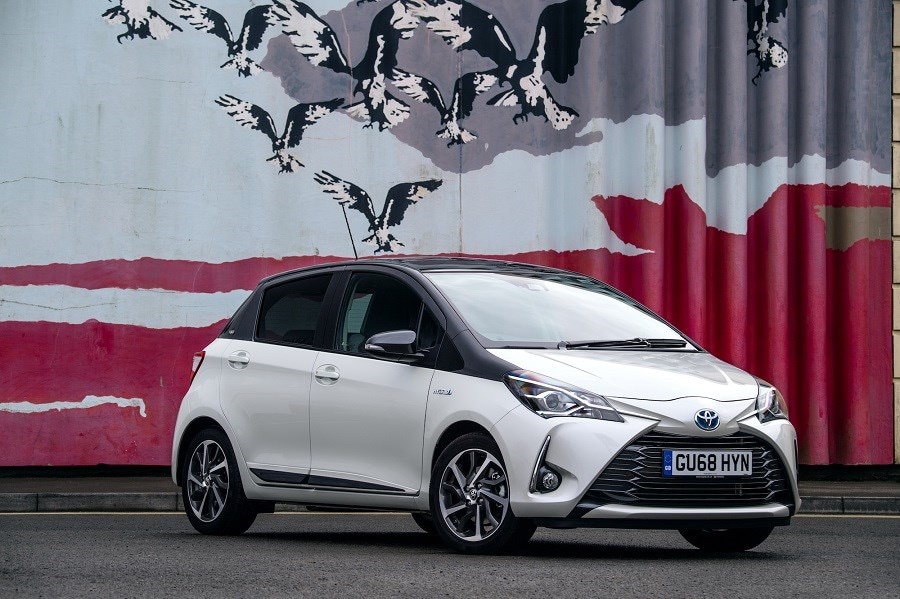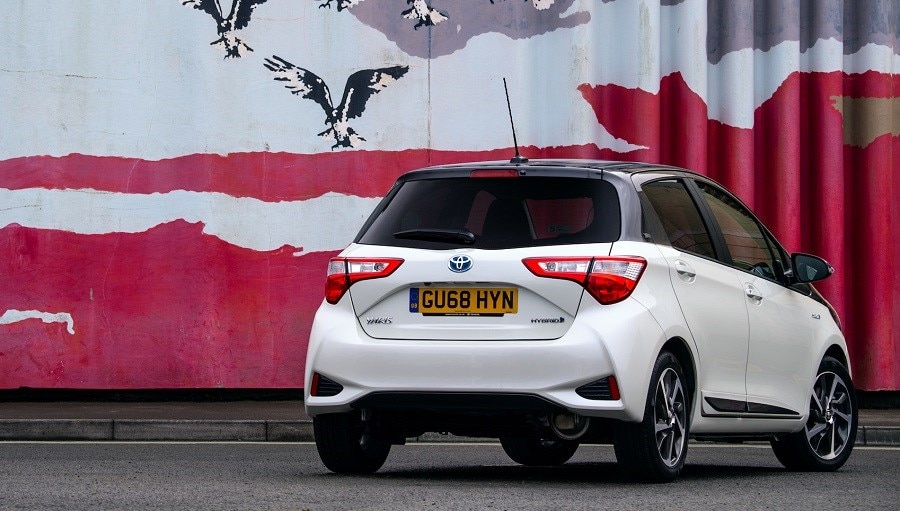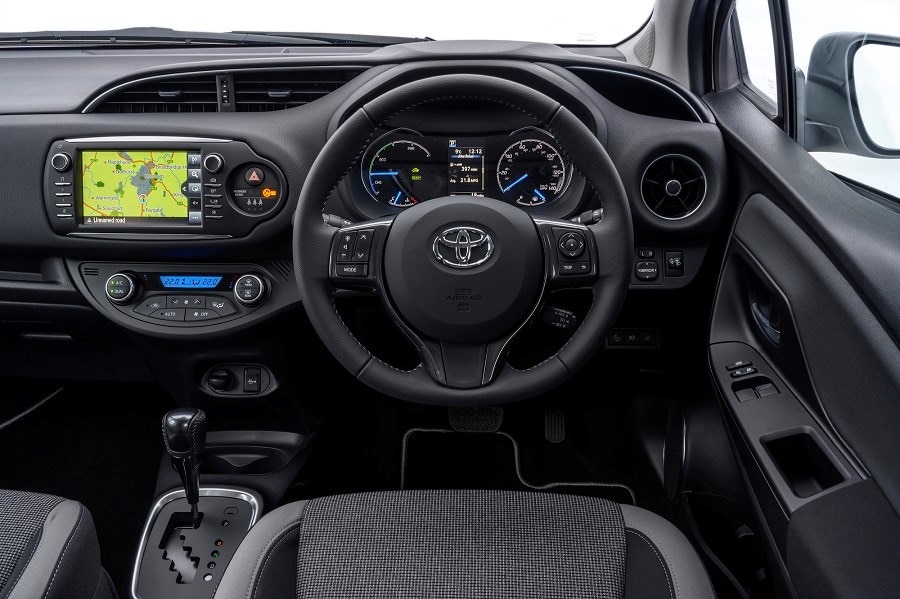Model Review
Designed as a global model, the Yaris was and is a hugely important model for Toyota. When it was revealed in the late-90s, it was the right car for the right time, thanks in part to its cost cutting, affordability and cheap running costs.
Based on the 1997 ‘Funtime’ concept, the first Yaris arrived in Europe in April 1999, with other markets badging the small Toyota as Vitz or Echo.
As with all Yaris models, the supermini has been available as either a three or five-door, with the first-generation car being stylish and spacious inside, while a faster ‘T-Sport’ model strengthened the line-up, too.
An equally compact second-generation Yaris reached UK showrooms at the start of 2006, while the most recent third-generation version went on sale in 2011.
This would be the first Yaris to use hybrid technology in order to reduce running costs. This car’s longer wheelbase and length allowed for improved cabin space. It was facelifted for the first time in 2017 with a new ‘X’ motif borrowed from the Aygo; improvements were made to the interior quality and driving dynamics.
Latest model
For 2017, Toyota revised its Yaris for the second time. The alterations were largely minor, with the supermini benefitting from new rear lights, new bumpers and a fresh colour palette. Revised interior elements and materials were also used, with each trim level offering a different colour for the cabin.
Hot hatch fans were delighted by the Yaris GRMN, which was the first true Toyota hot hatch in years. The rally-inspired model used a supercharged 1.8-litre petrol engine that produced 205bhp.
To mark 20 years since the Yaris was unveiled at the 1998 Paris Motor Show, Toyota revealed a new Y20 special edition at the 2018 event. An original launch edition was limited to 1,998 units, and came in a gold paint similar to that of the original car. A non-limited Y20 model comes with dark grey styling features, a bi-tone roof, 16-unch alloy wheels and tinted glass.
Toyota also introduced the GR Sport, which aims to build on the success and popularity of the GRMN with styling details taken from the hot hatch, 17-inch alloy wheels and adjustments to the suspension and handling. It looks the part, but it’s not as sporty as it appears as it’s only offered with the sluggish hybrid powertrain.
Value for money
The Yaris is attractively priced, starting at £12,995. For that money you get an entry-level Active-spec car, which comes with plenty of kit — particularly when it comes to safety equipment. As standard it gets autonomous emergency braking, automatic lights and lane departure warning, while it misses out on a touchscreen and alloy wheels, which buyers have come to expect from superminis.
By comparison the hybrid looks a bit expensive, as it commands a £3,000 premium over the standard petrol model. The range-topping GR Sport and Excel hybrids look quite overpriced next to more accomplished rivals, even when you consider all the kit that comes as standard.
Anyone wanting cheap and reliable transport will be able to find a first-generation Yaris for under £1,000, even if it has low mileage.
As for the third-generation car, the cheapest we could find was a 2012 model for £3,000, which had lot of miles on the clock. Expect to pay around £4,000 for something that has covered around 60,000 miles. There are also some good deals on nearly-new versions, with one-year-old examples available at around £10,000; some £3,000 off list price. Even higher-spec cars aren’t much more expensive.
Looks and image
Two revisions have kept the Yaris looking fresh-faced, with its X-shaped front grille being a particular highlight. It struggles to hide its age in some regards, but Toyota does a good job of keeping on top of trends when it updates existing models.
Highlights on the current Yaris include bi-coloured models — which have had their own special editions in the past — while the latest Y20 special editions and GR Sport have added some extra style and sportiness to the Yaris line-up. In short, high-spec versions are far more stylish than the somewhat bland looking entry-level cars.
That said, the interior isn’t quite working to the same form.
Compared to newer rivals such as the Ford Fiesta and Seat Ibiza, the Toyota’s cabin is lacking in technology and style. It’s a benefit that all versions barring the entry-level Active come with a seven-inch touchscreen, but it’s a lagging screen that has outdated graphics, and it’s not helped by its lack of Android Auto and Apple CarPlay, which isn’t even offered on the options list.
The interior quality isn’t up to the standard expected, either, with hard plastics used throughout the admittedly well put together cabin. On the plus side, the Yaris adopts a clutter-free layout, and the various trim levels can come with different dashboard colours, which adds some extra flair to the cabin.
The Yaris is tailored towards a relaxed driving experience, which means that it’s somewhat average behind the wheel. It lacks feel and doesn’t give you the confidence to drive it quickly, but around town light controls and excellent visibility make it ideal. A reversing camera is fitted to all but the entry-level model, which is a bonus when you consider that it’s an optional extra on all Volkswagen Polos. However, the Hybrid model is let down by a disappointing and dim-witted CVT gearbox.
Space and practicality
The Yaris has always sat at the smaller end of the supermini market, and the new model is no different, as it’s smaller than the Volkswagen Polo and Seat Ibiza, which means that it doesn’t have the same level of spaciousness as those class-leading models.
However, the space is still used well in the interior. The rear seats offer an excellent amount of headroom and legroom considering the Yaris’s size, although the boot space falls short of newer rivals, offering a 286-litre. That’s over 100 litres less than the new Renault Clio, for example. Folding the rear seats increases the total boot area to 768 litres, although this still falls a long way short of the class best. On a positive note, the Hybrid isn’t any less practical than the standard car in this regard.
However, one category where the Yaris excels is safety. Toyota offers the car with its impressive ‘Safety Sense’ system, which includes autonomous emergency braking, lane-departure warning and automatic lights with high-beam assist. All this kit helped the updated Yaris gain a five-star Euro NCAP safety rating when it was tested in 2017.
Engines
The Yaris is offered with a choice of two petrol engines and a hybrid setup.
The entry-level engine is a 71bhp 1.0-litre unit, which is paired to a five-speed manual gearbox. It’s hard to recommend to all but first drivers and city drivers as its 0-60mph time of 15.1 seconds makes it difficult to get up to speed. The second engine is a 109bhp, 1.5-litre unit, which is offered with the choice of a six-speed manual gearbox or a CVT automatic. Its 0-60mph time of 10.8 seconds makes it the quickest in the line-up.
The hybrid uses a 1.5-litre petrol engine with a total output of 99bhp, which is paired with a CVT automatic gearbox. It feels slower than the 0-60mph time of 11.6 seconds would have you believe.
Running costs
All engines in the Yaris are efficient to run. The hybrid is the best choice for those wanting to cut their running costs, as it can return up to 76.3mpg on the combined cycle, with low CO2 emissions of 84g/km; this makes it one of the cleanest non plug-in models on sale. Out of the other two petrol engines, the 1.0-litre unit is the cleanest, as it can manage a claimed fuel economy figure of 61.4mpg, with CO2 emissions of 106g/km.
Insurance premiums will also be low, with the 1.0-litre petrol engine being ideal for new drivers. The Yaris falls into insurance groups four through 11, depending on trim and engine.
The Yaris’s five-year (100,000-mile) warranty is also one of the best out there, and is only beaten by the Kia Rio’s seven-year warranty, though that is also capped at 100,000 miles.
Things to look out for
Toyota has one of the best reputations for reliability out of all manufacturers, and the Yaris has also proven to be a highly-dependable model. The only known issues are that the satellite navigation can prove to be unreliable and show the car to be in the wrong location, while the discontinued 1.4-litre diesel engine is known to suffer from diesel particulate filter (DPF) issues.
Rivals
The supermini class is a highly competitive market, and the Yaris has no shortage of accomplished rivals. The class-leading models are the Ford Fiesta, Seat Ibiza and Volkswagen Polo, and other promising rivals include the Skoda Fabia, Kia Rio, Vauxhall Corsa, Hyundai i30, Nissan Micra and Honda Jazz.
Depreciation
The Yaris is great value on the used market, with discounts of over £3,000 available off nearly-new models; a welcome discount that makes Toyota’s supermini an attractive used buy.





